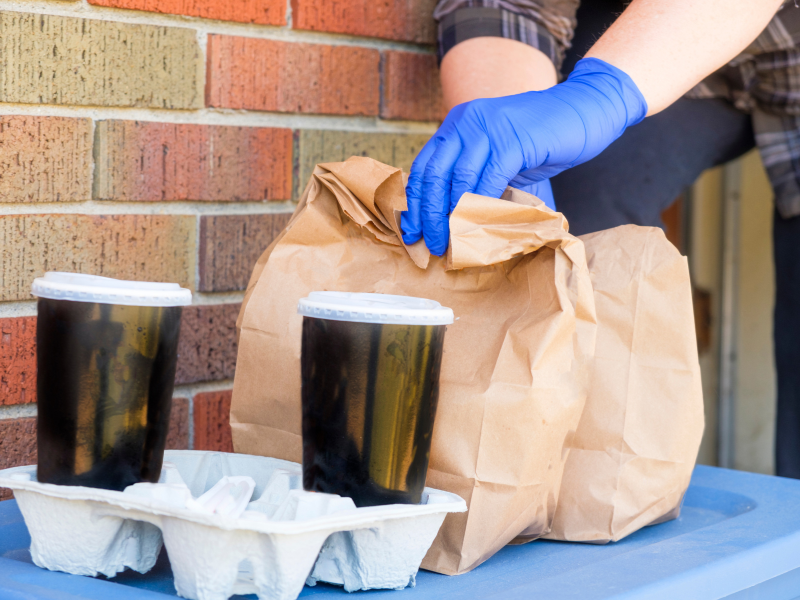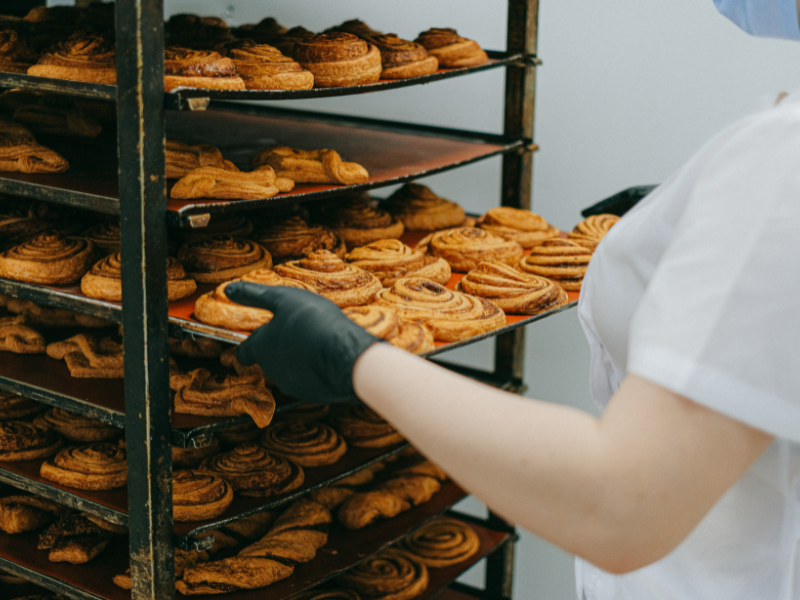In the Bustling World of Bakeries
Maintaining hygiene is as essential as creating delicious treats. While many tools contribute to this, one that often goes unnoticed is the humble glove. Among the options available, nitrile gloves are increasingly popular. But why do bakers love them? Let’s dive into why nitrile gloves might just be the best choice for your bakery.
Understanding Nitrile Gloves

What Are Nitrile Gloves?
First and foremost, nitrile gloves are made from a synthetic rubber known as nitrile butadiene. Unlike latex gloves, which come from natural rubber, nitrile gloves are entirely synthetic, making them an excellent alternative for those with latex allergies. They’re known for their durability, puncture resistance, and versatility, especially in a busy setting like a bakery.

Why Nitrile Gloves Are Commonly Used in Bakeries
Now, you might wonder, why nitrile gloves for bakery work? Well, nitrile gloves are food-safe, which means they meet the necessary standards for handling food items. This is crucial because the last thing you want is for your gloves to contaminate your dough or pastries. Additionally, they are more resistant to punctures and chemicals, making them reliable when you’re handling sharp tools or greasy ingredients. In short, they help you maintain hygiene and safety in your bakery.
Common Questions About Nitrile Gloves in Bakeries
Are Nitrile Gloves Food-Safe?
Yes, nitrile gloves are absolutely food safe. This is one of the main reasons they’re so popular in the food industry, including bakeries. You can confidently use them to handle ingredients without worrying about contamination.

Do Nitrile Gloves Cause Allergies?
This is a common concern, especially for those sensitive to latex. The good news? Nitrile gloves are latex-free. This means they’re a safe choice for everyone, even those with latex allergies. No more worries about itching or irritation while you’re baking up a storm.
How Durable Are Nitrile Gloves?
Durability is another key reason bakers prefer nitrile gloves. They are more resistant to punctures and tears than latex or vinyl gloves, making them perfect for handling everything from dough to cleaning tools. In a fast-paced bakery, where accidents can happen, this durability can save you time and effort.
Do Nitrile Gloves Affect the Sense of Touch?
While nitrile gloves are durable, they still offer excellent tactile sensitivity. Some people might feel they’re not as sensitive as latex gloves, but for most bakery tasks, nitrile gloves provide more than enough touch sensitivity. You’ll still be able to knead dough, decorate cakes, and perform other delicate tasks without losing that all-important “feel.”
Can Nitrile Gloves Withstand High Temperatures?
One thing to note, however, is that nitrile gloves aren’t designed to handle high temperatures. While they are resistant to oils and chemicals, direct exposure to heat can cause them to melt. So, it’s best to avoid using them when handling hot trays or pans straight out of the oven.
Pros of Using Nitrile Gloves in a Bakery
Allergy-Friendly
One of the biggest advantages of nitrile gloves is that they’re allergy-friendly. Since they’re latex-free, you don’t have to worry about allergic reactions. This is particularly important in a bakery, where staff and customers might have sensitivities.

Durability
When it comes to durability, nitrile gloves are top-notch. They’re more resistant to punctures and tears, which means they’ll last longer, even in a busy bakery. Whether you’re handling dough, cutting fruits, or cleaning up, nitrile gloves are up to the task.
Versatility
Another reason nitrile gloves are great for bakeries is their versatility. You can use them for a variety of tasks, from handling ingredients to cleaning up. Plus, they’re resistant to many chemicals and oils, so you don’t have to worry about them breaking down when you’re working with greasy or oily substances.
Chemical Resistance
Speaking of resistance, nitrile gloves offer excellent protection against oils and many chemicals commonly found in a bakery. This makes them ideal for tasks like handling buttery dough or cleaning with harsh chemicals.
Cons of Using Nitrile Gloves in a Bakery
Cost
Of course, there are a few downsides to consider. Nitrile gloves tend to be more expensive than latex or vinyl gloves. However, many bakers find that the durability and benefits of nitrile gloves justify the higher cost.
Reduced Tactile Sensitivity
Another point to consider is the tactile sensitivity. While nitrile gloves offer good sensitivity, some bakers might find them slightly less sensitive than latex gloves, especially for intricate tasks like cake decorating.
Environmental Impact
One downside that might concern you is the environmental impact. Nitrile gloves are not biodegradable, which means they contribute to waste. If sustainability is important to you, this is something to keep in mind.
Heat Sensitivity
Lastly, nitrile gloves can’t withstand high temperatures. They may melt if exposed to hot surfaces or open flames. So, while they’re great for most tasks in the bakery, you’ll need to be cautious when working around heat.
In conclusion
Nitrile gloves offer many benefits for bakery work, from durability to allergy-friendliness. While they do have a few drawbacks, such as cost and environmental impact, many bakers find that the pros outweigh the cons. If you’re looking for reliable, food-safe gloves for your bakery, nitrile gloves are definitely worth considering.
Discover our Nitrile Gloves products here

Leave a Reply
You must be logged in to post a comment.